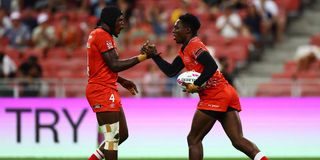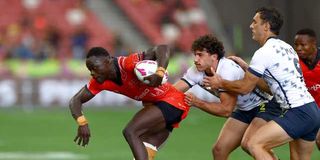
Fiji’s Joji Nasova (centre) is tackled by Kenya’s Samuel Asati (right) and Kevin Wekesa on April 6, 2025 in Main Cup final match of the Singapore Sevens at National Stadium, Singapore.
In New York
Just before the Los Angeles Sevens was held on May 3 and 4, World Rugby made major changes to the Sevens (SVNS) Series format. This raised objections from emerging sevens nations in Africa including Uganda, Zimbabwe and Madagascar.
For these countries, it appears their dream of clinching core sevens series status, is held even further back with the decision of World Rugby to change the series format.
Under the new structure, after the Los Angeles Sevens, the Lionesses and Shujaa secured their spots in the Division Two series for the 2025-26 season. Division One is composed of the eight top teams from the men’s and women’s series.

Kenya's Nygel Pettersan Amaitsa celebrates with his team mate Vincent Onyala after scoring their first try against Fiji in Main Cup final match of the Singapore Sevens tournament at National Stadium in Singapore on April 6, 2025.
The unsuccessful qualifying teams from the LA Sevens will start the 2026 rugby season in their respective regional competitions from where they will fight to qualify for a standalone Division Three event
Top two finishers from Division Three will earn promotion to Division Two.
Therefore, countries like Uganda, Zimbabwe and Madagascar, will have to start even further back from Division One making it harder for them to qualify for the lucrative Division One.
While South Africa maintained its core men’s sevens status, its women’s team will have to work through the continental qualifier route to progress into Division Two.
The South African ladies lost to perennial rivals Kenya in the LA Sevens. Kenya also felt cheated in both the men’s and women’s versions.
Former Zimbabwe Sevens Cheetah’s coach Graham Kaulback, is quoted as saying in the Zimbabwe Independent newspaper that “World Rugby’s recent changes to the promotion and relegation criteria for the HSBC World Rugby Sevens Series will make it harder for teams aspiring to reach the pinnacle of the shorter format of the game”.

Kenya’s Patrick Odongo plays against Spain in Singapore Sevens, the fifth leg of the 2024/2025 World Rugby Sevens series, on April 6 at the National Stadium in Singapore.
Coming to the LA Sevens, both Kenyan sides only needed to finish among the top four in their respective play-offs, to make it back to the World Sevens Series for the 2025-26 season.
This was not to be with the abrupt format change. The new structure hurts sevens rugby in Africa by introducing a three-division competition model, reducing the number of teams in the top tier from 12 to eight. World Rugby had reduced the competition from 16 to 12 nations in 2023.
Critics of the new format opine that African rugby federations were not consulted before these changes were finalised.
The 2026 Sevens World Series format is complex and exclusive to the big boys of the game.
This could frustrate both players and fans. World Rugby maintains that the changes to the format will expand the calendar and improve competitiveness.
Kenya Sevens coach Kevin “Bling” Wambua and Kenya Lionesses coach Dennis Mwanja, argue that the restructuring has been poorly communicated and lacks transparency.

Kenya Lionesses celebrate their Cup victory at the 2025 HSBC Sevens Challenger - Cape Town 1 at Athlone Sports Stadium on March 2, 2025 in Cape Town, South Africa.
“The change of fixtures for the girls is really demotivating. They have worked so hard during the Challenger Series and emerged champions. This is not fair to tier two rugby nations or to the fairness to the sevens circuit,” Mwanja said.
“The change of qualification structures into the HSBC core tier one and a creation of other lower tier divisions is very frustrating to the boys. They began the year knowing if they were in the top four of the LA Sevens, they would make the core HSBC series for the second year running. However, this was not to be and I have to motivate the boys to put this behind them and focus on the future,” said Wambua.
Uganda Rugby Union CEO Issac Lutwama said the restructuring only holds Uganda back in its sevens development.
“The older version presented a much clearer path to qualification to core SVNS status. The new structure only makes it harder for tier two countries like Uganda to make it to the elite level. Already, tier two teams were playing only three tournaments compared to eight for core status nations. So lower tier teams were already at a disadvantage from lack of exposure to the highest level of competition. It reinforces the gap between the top eight teams and the rest of the sevens world rugby community.”
The repercussion of format changes are unfolding.
Last week Irish Rugby Football Union announced it was scrapping its sevens programme.
Former World Rugby sevens Player of the Year Terry Kennedy said IRFU’s decision was “nothing short of a disgrace”.
He added that the current group of Irish players will not be afforded the same opportunities that he was provided because of the short sightedness of the people running World Rugby.
Former England, Kenya and USA sevens coach Mike Friday was more critical of World Rugby.
On his X account this month he stated that the restructuring was not transparent and was based purely on financial considerations.
“The pathway for lower tier nations is neither clear nor inspiring. It protects tier one nations. This restructuring will be successful in suppressing the developing nations, widening the gap between tier one and lower tiers, while providing less of an opportunity for lower tier nations to make the jump into tier one”.
World Rugby insists these changes will secure the future of sevens but the format appears to have locked out lower tier teams from the exclusive club of the rich rugby nations.






